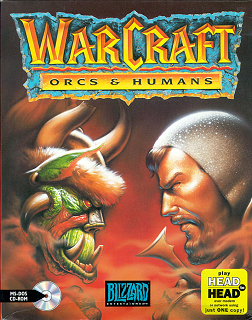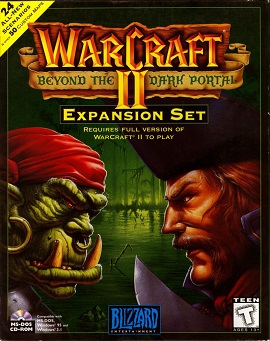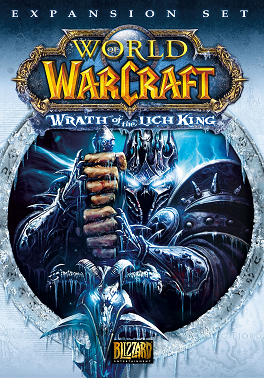
Warcraft: Orcs & Humans is a real-time strategy game (RTS) developed and published by Blizzard Entertainment, and published by Interplay Productions in Europe. It was released for MS-DOS in North America on 15 November 1994, and for Mac OS in early 1996. The MS-DOS version was re-released by Sold-Out Software in 2002.

World of Warcraft (WoW) is a massively multiplayer online role-playing game (MMORPG) released in 2004 by Blizzard Entertainment. Set in the Warcraft fantasy universe, World of Warcraft takes place within the world of Azeroth, approximately four years after the events of the previous game in the series, Warcraft III: The Frozen Throne. The game was announced in 2001, and was released for the 10th anniversary of the Warcraft franchise on November 23, 2004. Since launch, World of Warcraft has had nine major expansion packs: The Burning Crusade (2007), Wrath of the Lich King (2008), Cataclysm (2010), Mists of Pandaria (2012), Warlords of Draenor (2014), Legion (2016), Battle for Azeroth (2018), Shadowlands (2020), and Dragonflight (2022). Three further expansions, The War Within, Midnight, and The Last Titan, were announced in 2023.

Warcraft Adventures: Lord of the Clans is a cancelled graphic adventure game developed by Blizzard Entertainment and Animation Magic from 1996 until 1998. Set in the Warcraft universe after the events of Warcraft II: Beyond the Dark Portal, it followed the orc character Thrall in his quest to reunite his race, then living on reservations and in slavery following its defeat by the human Alliance. Assuming the role of Thrall, the player would have used a point-and-click interface to explore the world, solve puzzles and interact with characters from the wider Warcraft series.

Warcraft II: Beyond the Dark Portal is an expansion pack for the real-time strategy video game Warcraft II: Tides of Darkness for MS-DOS, Microsoft Windows and Macintosh. It was developed by Blizzard Entertainment and Cyberlore Studios, and published by Blizzard in North America and Europe in 1996. It requires the full version of the original game to run and adds new story campaigns and multiplayer maps. The expansion was later released alongside Tides of Darkness for the PlayStation and Sega Saturn in 1997 as Warcraft II: The Dark Saga, and was included in the Warcraft II: Battle.net Edition for Windows PC and Macintosh in 1999.

Wookieepedia: The Star Wars Wiki is an online encyclopedia for information about the Star Wars universe—including information on all the films, the books, as well as Clone Wars, The Clone Wars and its introductory film, Rebels, the Star Wars Expanded Universe, and any upcoming Star Wars material. It is a wiki focused on the Star Wars universe with some articles reaching up to 60,000 words, and is written almost entirely from an in-universe perspective. The name is a portmanteau of Wookiee and encyclopedia, a pun on the name of Wikipedia. The logo, too, is a visual pun showing the incomplete second Death Star as opposed to Wikipedia's incomplete "jigsaw logo".

World of Warcraft: The Burning Crusade is the first expansion set for the MMORPG World of Warcraft. It was released on January 16, 2007 at local midnight in Europe and North America, selling nearly 2.4 million copies on release day alone and making it, at the time, the fastest-selling PC game released at that point. Approximately 3.53 million copies were sold in the first month of release, including 1.9 million in North America, nearly 1.6 million in Europe, and over 100,000 copies in Australia.

BlizzCon is an annual gaming convention held by Blizzard Entertainment to promote its major franchises including Warcraft, StarCraft, Diablo, Hearthstone, Heroes of the Storm, and Overwatch.

The Corrupted Blood incident took place between September 13 and October 8, 2005, in World of Warcraft, a massively multiplayer online role-playing game (MMORPG) developed by Blizzard Entertainment. When participating in a boss battle at the end of a raid, player characters would become infected with a debuff that was transmitted between characters in close proximity. While developers intended to keep the effects of the debuff in the boss's game region, a programming oversight soon led to an in-game pandemic throughout the fictional world of Azeroth.

Christopher Vincent Metzen is an American game designer, artist, voice actor, and author known for his work creating the fictional universes and scripts for Blizzard Entertainment's three major award-winning media franchises: Warcraft, Diablo and StarCraft. Metzen was hired by Blizzard Entertainment as an animator and an artist; his first work for the company was with the video game Justice League Task Force.

Leeroy Jenkins is a player character created by Ben Schulz in Blizzard Entertainment's multiplayer online video game World of Warcraft. The character became popular in 2005 from his role in a viral video of game footage where, having been absent during his group's discussion of a meticulous battle plan, Leeroy returns and ruins it by charging straight into combat while shouting his own name as a battle cry. The video capturing the character's behavior became an Internet meme. As a result of positive reception to the meme, Blizzard subsequently added Leeroy Jenkins into World of Warcraft as an official non-player character and as a minion card and later as a hero in the online card game Hearthstone.

World of Warcraft: Wrath of the Lich King is the second expansion set for the massively multiplayer online role-playing game (MMORPG) World of Warcraft, following The Burning Crusade. It launched on November 13, 2008 and sold 2.8 million copies within the first day, making it the fastest selling computer game of all time released at that point. The game added a substantial amount of new content into the game world, including the new continent of Northrend, home of The Lich King Arthas and his undead minions. In order to advance through Northrend, players were required to reach at least level 68, with the level cap for the expansion being 80. The first hero class was introduced, the Death Knight, that starts at level 55.
World of Warcraft, or WoW, is set in a fictional universe, its primary setting being the planet of Azeroth. The first expansion, The Burning Crusade, introduced a second planet, Outland. Wrath of the Lich King and Cataclysm expanded upon Azeroth and respectively added Northrend, the frigid northern continent of Azeroth, and drastically changed various other continents by destroying some and unveiling new ones. The next expansion, Mists of Pandaria, added Pandaria, the southern continent previously hidden behind a perennial mist cover. Warlords of Draenor introduced the planet of Draenor, a version of Outland in a different timeline before its partial destruction. The Legion expansion took adventurers to the Broken Isles, an island chain near the Maelstrom in the middle of the Great Sea, and the damaged planet Argus, the headquarters of the Burning Legion. The seventh expansion, Battle for Azeroth, added two new island continents to the center of Azeroth: Kul Tiras and Zandalar. The latest expansion, Shadowlands, introduced the eponymous Shadowlands, a realm composed of five major zones: Bastion, Maldraxxus, Ardenweald, Revendreth, and the Maw.
Glider, also known as WoWGlider or MMOGlider, was a bot created by MDY Industries, which interoperated with World of Warcraft. Glider automated and simplified actions by the user through the use of scripting to perform repetitive tasks while the user was away from the computer. This allowed the user to acquire in-game currency and level-ups of the character without being present to perform the required actions. As of 2008, it had sold approximately 100,000 copies. Glider was ultimately discontinued after a lawsuit was filed against MDY Industries by Blizzard Entertainment.

World of Warcraft: Cataclysm is the third expansion set for the massively multiplayer online role-playing game (MMORPG) World of Warcraft, following Wrath of the Lich King. It was officially announced at BlizzCon on August 21, 2009, although dataminers and researchers discovered details before it was announced by Blizzard. The expansion was released on December 7, 2010.

Fandom is a wiki hosting service that hosts wikis mainly on entertainment topics. The privately held, for-profit Delaware company was founded in October 2004 by Wikipedia co-founder Jimmy Wales and Angela Beesley. Fandom was acquired in 2018 by TPG Inc. and Jon Miller through Integrated Media Co.
Nukapedia, also known as Fallout Wiki, is a wiki about the Fallout fictional universe. It covers all of the Fallout video games, as well as all Fallout related content. The Fallout Wiki runs on MediaWiki and is currently part of the Fandom network. The site is also available in several other languages, including Bulgarian, Chinese, Dutch, French, German, Hebrew, Hungarian, Italian, Japanese, Norwegian, Polish, Portuguese, Russian, Spanish, Swedish and Turkish and Ukrainian.

Curse was a gaming company that managed the video game mod host CurseForge, wiki host Gamepedia, and the Curse Network of gaming community websites.

World of Warcraft: Legion is the sixth expansion set in the massively multiplayer online role-playing game (MMORPG) World of Warcraft, following Warlords of Draenor. It was announced on August 6, 2015 at Gamescom 2015. The expansion was released on August 30, 2016.

World of Warcraft Classic is a 2019 MMORPG video game developed and published by Blizzard Entertainment. Running alongside the main version of the game, Classic recreates World of Warcraft in the state it was in before the release of its first expansion, The Burning Crusade. It was announced at BlizzCon 2017 and was released globally August 26, 2019. The Burning Crusade Classic and Wrath of the Lich King Classic versions of the game were later released to allow players to progress to those expansions.

















